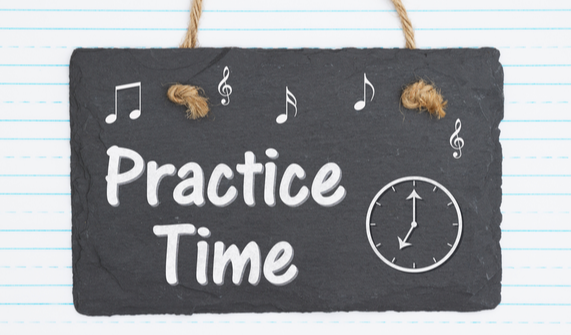There is an ideal statement that every music instructor makes when it comes to how much time a music student should be dedicated to practicing his or her instrument. As with all things in life, the key is consistency and planning. Setting realistic goals will keep you motivated while tracking progress will provide you with a foundation to have a positive frame of mind.
Benjamin Franklin once said, “If you fail to plan, you are planning to fail.” While he probably wasn’t referring to practicing a musical instrument, this mentality can surely be applied to making sure practicing is part of a positive and productive means to becoming the best musician you can be.
So the first task is to take out your agenda or look at that Google Calendar to make some time in your schedule for practicing. Remember that consistency is key, so if you can’t dedicate time every day to practice, then try every two days but make sure you stick to it.
The next question that comes to mind is how long each practice session should be. Let’s look at two scenarios, time-based and task-based practice sessions.
Time-Based Practice Sessions
This is a good strategy for someone that has less flexibility in their schedule. From a high level, you might decide that you only have 30 minutes a day to practice. Instead of just putting 30 minutes down, dive a little deeper and decide what those 30-minute sessions will look like. Taking this one step further, you can divide your practice over a 3-day cycle to touch on several important elements that make up a well-rounded practice routine:
Day 1
10 minutes on Warm-up and scales in C/F/Bb/Eb (as you get better with major scales, switch it up with other scales)
10 minutes on Fundamental Technique (depending on your instrument, you might want to pick finger dexterity exercises for flexibility)
10 minutes on “Song A” Section 1
Day 2
10 minutes on Warm-up and scales in Ab/Db/F#/B (as you get better with major scales, switch it up with other scales)
10 minutes on Fundamental Technique (depending on your instrument, you might want to work on range development)
10 minutes on “Song A” Section 2 OR “Song B”
Day 3
10 minutes on Warm-up and scales in E/A/D/G (as you get better with major scales, switch it up with other scales)
10 minutes on Fundamental Technique (depending on your instrument, you might want to a tone development exercise)
10 minutes on “Song A” Section 3 OR “Song B” OR “Song C”
Task-Based Practice Sessions
This is beneficial for those that have wiggle room or a more open schedule and want to deep-dive on a specific area of playing. In this scenario, you will still create placeholders or tasks in your agenda or google calendar, but instead of assigning a block of time, you will create tasks that you want to carry out each day.
You still want to be mindful of the various fundamental techniques that are important to your instrument. Here is an example of a task-based schedule:
Monday
Practice/memorize 3 major scales (C/D/E)
Work on verse 1 of “Song A”
Tuesday
Practice/memorize chord changes to “Song A”
Do Range exercise “x”
Wednesday
Listen to Song A and transcribe by ear the first 8 bars of the solo
Play through tone development exercises
No matter if you prefer the time-based or task-based practice approach, record your results. Make lots of notes about how your progress is going by indicating metronome markings for exercises and even write down your thoughts on why a specific exercise may give you a hassle. Recording data and seeing progress, even minor progress like going from 60bpm to 62bpm, will create a sense of forward momentum.
Now that you are aware of these tools and strategies, what else can you do to help your journey to becoming the musician you want to be? Check out THIS BLOG if you are an Adult Learning to Play Music and CONTACT US for private online music lessons to fast charge your progress on any instrument.

